

Repeated drought in east Africa may prompt aid rethink - environment - 27 January 2012. RAINFALL patterns over east Africa have changed in a way that makes severe droughts more likely - and this means aid agencies need to rethink the way they operate.
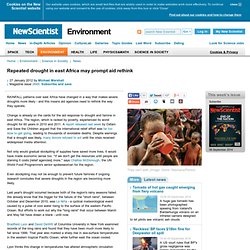
Change is already on the cards for the aid response to drought and famine in east Africa. The region, which is racked by poverty, experienced its worst drought for 60 years in 2010 and 2011. A report released last week by Oxfam and Save the Children argued that the international relief effort was far too slow to get going, leading to thousands of avoidable deaths. Despite warnings that a drought was likely, many donors refused to act until the crisis received widespread media attention.
Not only would gradual stockpiling of supplies have saved more lives, it would have made economic sense too. The most important story in the world: Guardian reporter Jonathan Watts’ parting thoughts on nine years of environmental journalism in China. This is the text of a speech given by Jonathan Watts at the 2012 China Environmental Press Awards in Beijing on April 10.

Delay Of Bloom Blamed On Climate Change. Climate Change Miscues May Shrink Species’ Outer Limits. Once-Rare Butterfly Species Now Thrives Thanks to Climate Change. Global Warming Wilts Malaria. A common assumption is that rising global temperatures will increase the spread of malaria — the deadly mosquito-borne disease that affects millions of people worldwide.
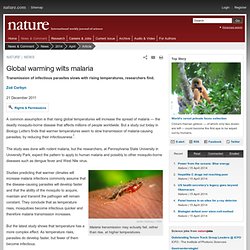
But a study out today in Biology Letters finds that warmer temperatures seem to slow transmission of malaria-causing parasites, by reducing their infectiousness1. The study was done with rodent malaria, but the researchers, at Pennsylvania State University in University Park, expect the pattern to apply to human malaria and possibly to other mosquito-borne diseases such as dengue fever and West Nile virus. James Gathany / CDC Malaria transmission may actually fall, rather than rise, at higher temperatures.
Wheat will age prematurely in a warmer world - environment - 29 January 2012. It could be much more difficult than we thought to feed everyone in a warmer world.
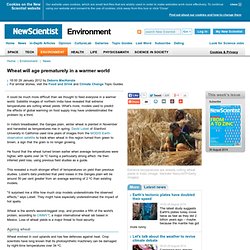
Satellite images of northern India have revealed that extreme temperatures are cutting wheat yields. What's more, models used to predict the effects of global warming on food supply may have underestimated the problem by a third. In India's breadbasket, the Ganges plain, winter wheat is planted in November and harvested as temperatures rise in spring. Nation of Kiribati considers relocation. Mild Winters May Shift Spread Of Mosquito-borne Illness. Mild winters appear to speed annual menu changes for disease-carrying mosquitoes.
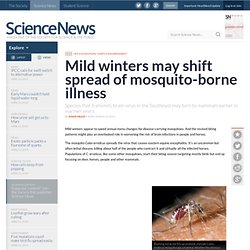
And the revised biting patterns might play an overlooked role in worsening the risk of brain infections in people and horses. Blushing red as she fills up on blood, a female Culex erraticus mosquito taps a mammal. Weather the previous winter plays a large role in when this species makes its annual shift from bird to mostly mammal blood. Rainforest in Transition: Is the Amazon Transforming before Our Eyes? The Amazon rainforest is in flux, thanks to agricultural expansion and climate change.
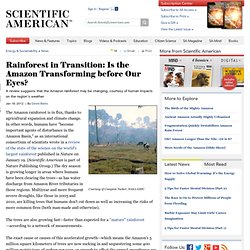
In other words, humans have "become important agents of disturbance in the Amazon Basin," as an international consortium of scientists wrote in a review of the state of the science on the world's largest rainforest published in Nature on January 19. (Scientific American is part of Nature Publishing Group.) Mowing down seagrass meadows will cut loose carbon - environment - 20 May 2012. They may be trickier than trees for environmental protesters to chain themselves to, but it turns out that seagrass ecosystems hold as much carbon per hectare as the world's forests – and are now among its most threatened ecosystems.
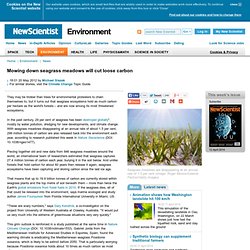
In the past century, 29 per cent of seagrass has been destroyed globally", mostly by water pollution, dredging for new developments, and climate change. With seagrass meadows disappearing at an annual rate of about 1.5 per cent, 299 million tonnes of carbon are also released back into the environment each year, according to research published this week in Nature Geoscience (DOI: 10.1038/ngeo1477). Piecing together old and new data from 946 seagrass meadows around the world, an international team of researchers estimated that seagrass captures 27.4 million tonnes of carbon each year, burying it in the soil below.
"These are scary numbers," says Gary Kendrick, a co-investigator on the project from University of Western Australia at Crawley, Australia. Amazon May Become Greenhouse Gas Emitter. Forest Bump - By Charles Kenny. Fewer jobs, dwindling savings, piles of public debt -- there's not much reason to be thankful for the global recession.

But one small silver lining is that it has slowed the rate at which we're turning the atmosphere into an over-amped electric blanket. There are two things at work here: First, less growth slows the demand for energy. During a recession, people make less, drive less, and even turn off lights more to save a couple dollars on the utility bill. That's the big factor behind greenhouse gas emissions in the United States having fallen 6 percent between 2008 and 2009, according to the Environmental Protection Agency. The second reason environmentalists can feel good about a recession is that lower demand for everything -- including wood and agricultural products -- reduces the incentive to chop down trees.
Tropical forests are home to about half of all species on Earth. NASA Finds 2011 is Ninth-Warmest Year on Record. Want to stay on top of all the space news?
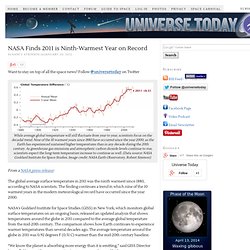
Follow @universetoday on Twitter. Warmer Planet Could Be Dominated by Mosquitoes, Tics, Rodents and Jellyfish. Imagine a planet where jellyfish rule the seas, giant rodents roam the mountains and swarms of insects blur everything in sight.
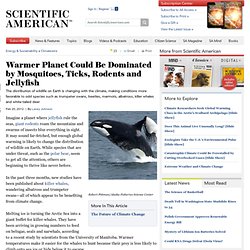
It may sound far-fetched, but enough global warming is likely to change the distribution of wildlife on Earth. Unusual Warmth Expected to Fuel Extreme Weather in the U.S. An active severe weather season is anticipated in the U.S. during spring of 2012 with the most widespread warmth since 2004. "As far as the forecast for the spring of 2012, we do feel like it's going to be a mild spring for most of the nation from the eastern Rockies into the Ohio Valley and Great Lakes area," Paul Pastelok, expert long-range meteorologist and leader of the AccuWeather.com Long-Range Forecasting Team, said. "At least two-thirds of the nation could wind up with above-normal temperatures. " The Northeast will be mild to start, while the central Plains and western Texas will be a particularly warm zone this spring.
An exception to the mild weather will be the Pacific Northwest, where temperatures will be below normal. NOAA Confirms Unprecedented Warmth in March. The National Oceanic and Atmospheric Administration has released its March 2012 National Overview report, confirming that March was more than just a month of scattered warmth--it shattered records across the U.S., becoming the only month ever recorded, except for January 2006, that had surpassed its record by such a large margin.
According to NOAA, the average temperature across the U.S. was 8.6 degrees above the 20th century average. However, the report did not just reveal that certain parts of the U.S. had unseasonable warmth; no region was exempt from the weather anomalies. Every state in the nation experienced at least one record warm daily temperature in March, totaling 15,272 warm temperature records broken.
Has Climate Change Really Made Thunderstorms More Powerful? Fears of Tornado Catastrophes Due to Global Warming Unfounded. Want to stay on top of all the space news? Follow @universetoday on Twitter. Climate Armageddon: How the World's Weather Could Quickly Run Amok [Excerpt] Adapted from The Fate of the Species: Why the Human Race May Cause Its Own Extinction and How We Can Stop It, by Fred Guterl (Bloomsbury USA, 2012).
The eminent British scientist James Lovelock, back in the 1970s, formulated his theory of Gaia, which held that the Earth was a kind of super organism. It had a self-regulating quality that would keep everything within that narrow band that made life possible. If things got too warm or too cold—if sunlight varied, or volcanoes caused a fall in temperatures, and so forth—Gaia would eventually compensate. This was a comforting notion. It was also wrong, as Lovelock himself later concluded. U.S. Defense Department Develops Map of Future Climate Chaos. University of Texas researchers have developed a sophisticated new mapping tool showing where vulnerability to climate change and violent conflicts intersects throughout the African continent.
Stripping CO2 from air requires largest industry ever - environment - 04 April 2012. Scientists Probe Mystery Molecule that Reduces Greenhouse Gases. How a Computer Modeler Predicted the Mountain Pine Beetle Tree-Killing Rampage. U.S. Military Forges Ahead with Plans to Combat Climate Change. Australian Wines Affected by Climate Change. Plant Movement from Climate Change Revealed in Interactive Map. The interactive USDA Plant Hardiness Map allows users to view the plants most likely to thrive in any U.S. region. Image by United States Department of Agriculture. Animals On The Move. "Climate-Smart Smallholders" by Paul Kagame. Exit from comment view mode. Click to hide this space KIGALI – Until the world’s small farmers adopt a series of necessary changes, climate talks such as the United Nations Rio+20 Summit, which will take place in Rio de Janeiro this June, will never translate into action. The emergence of a global green economy requires governments, other policymakers, and businesses from developed and emerging economies to recognize the inextricable linkages between climate change, the environment, and food security.
Climate Models Spell Hard Times for Tropical Farmers. Wild Plants Respond to Climate Change Quicker than Science Suggested. Hybrid wheat is worth its salt on irrigated land - environment - 14 March 2012. As Climate Becomes Less Certain, So Does China's Ability to Grow Enough Food. The rainmakers. World Bank Pushes for 'Green Accounting' by Nations. Sustainable Humanity - Jeffrey D. Sachs. New Storage Projects Turns CO2 into Stone. Natural Sinks Still Sopping Up Carbon. Save the Whales. Climate Change Impact on Human Health Overlooked. Climate change will make conservation even pricier - environment - 20 April 2012. Climate Change Expands Allergy Risk. Popular Opinion on Climate Change Traced to Political Elites.
Climate migration is a solution, not desperation - environment - 03 April 2012. Climate Change May Leave Many Mammals Homeless. Oil Sands' CO2 Emissions Could be Higher Than Thought. Volcanoes May Have Sparked Little Ice Age. First land plants plunged Earth into ice age - environment - 01 February 2012. Soot May Help Shift Tropics North.
Soil’s Hidden Secrets. Nitrogen Pollution Likely to Increase Under Climate Change. Arctic's Wintry Blanket Can Be Warming. Carbon capture and storage likely to cause earthquakes, say Stanford researchers. Jet Lag: What's Causing One of the Driest, Warmest Winters in History? The Sky Is Falling, Scientists Report. Strange skies: Seven wonders of the atmosphere. Rainfall Dissipates Energy via Friction with Air. Climate Forecasting: A Break in the Clouds. How Humans Cause Earthquakes. Old/Alternative Energy?